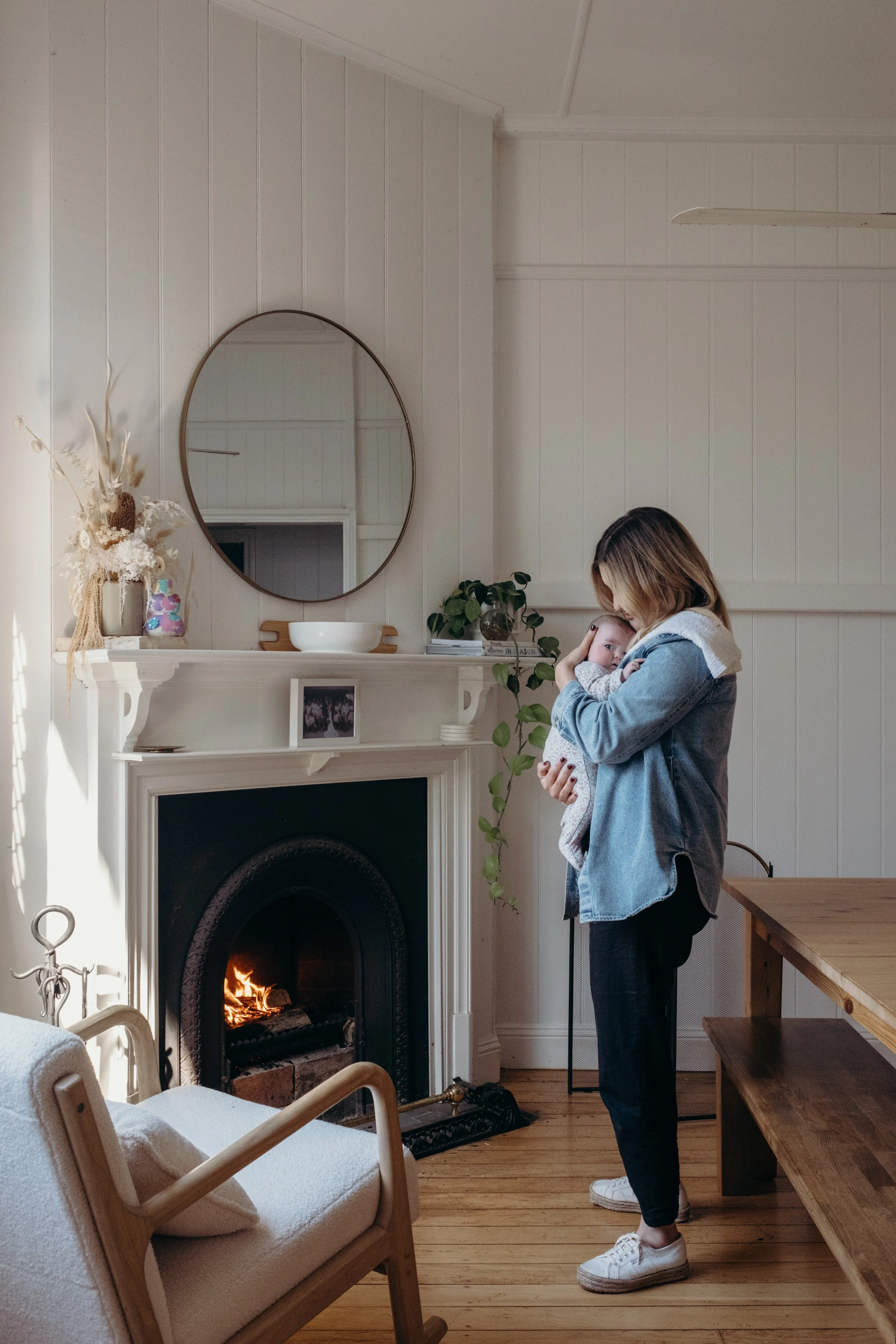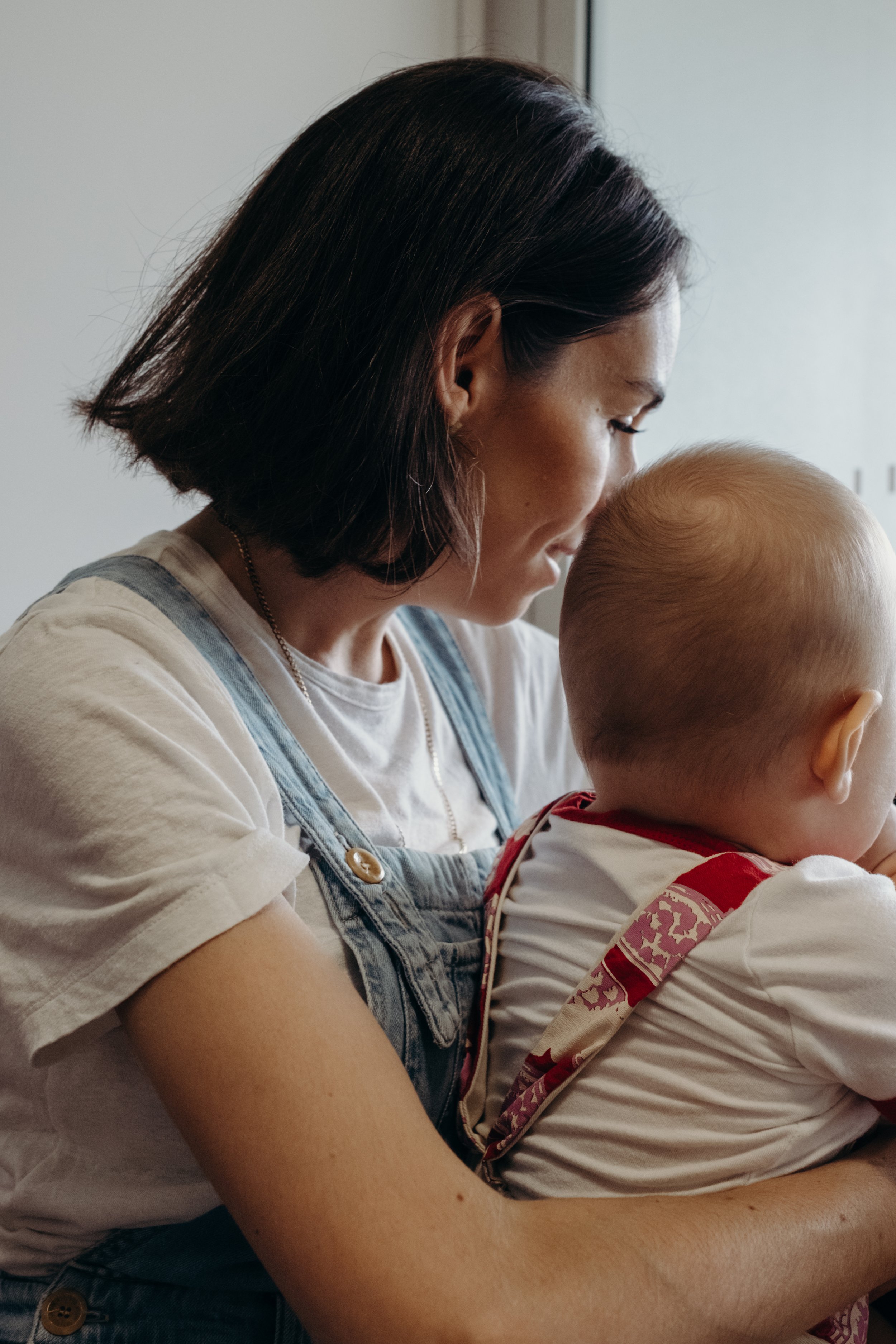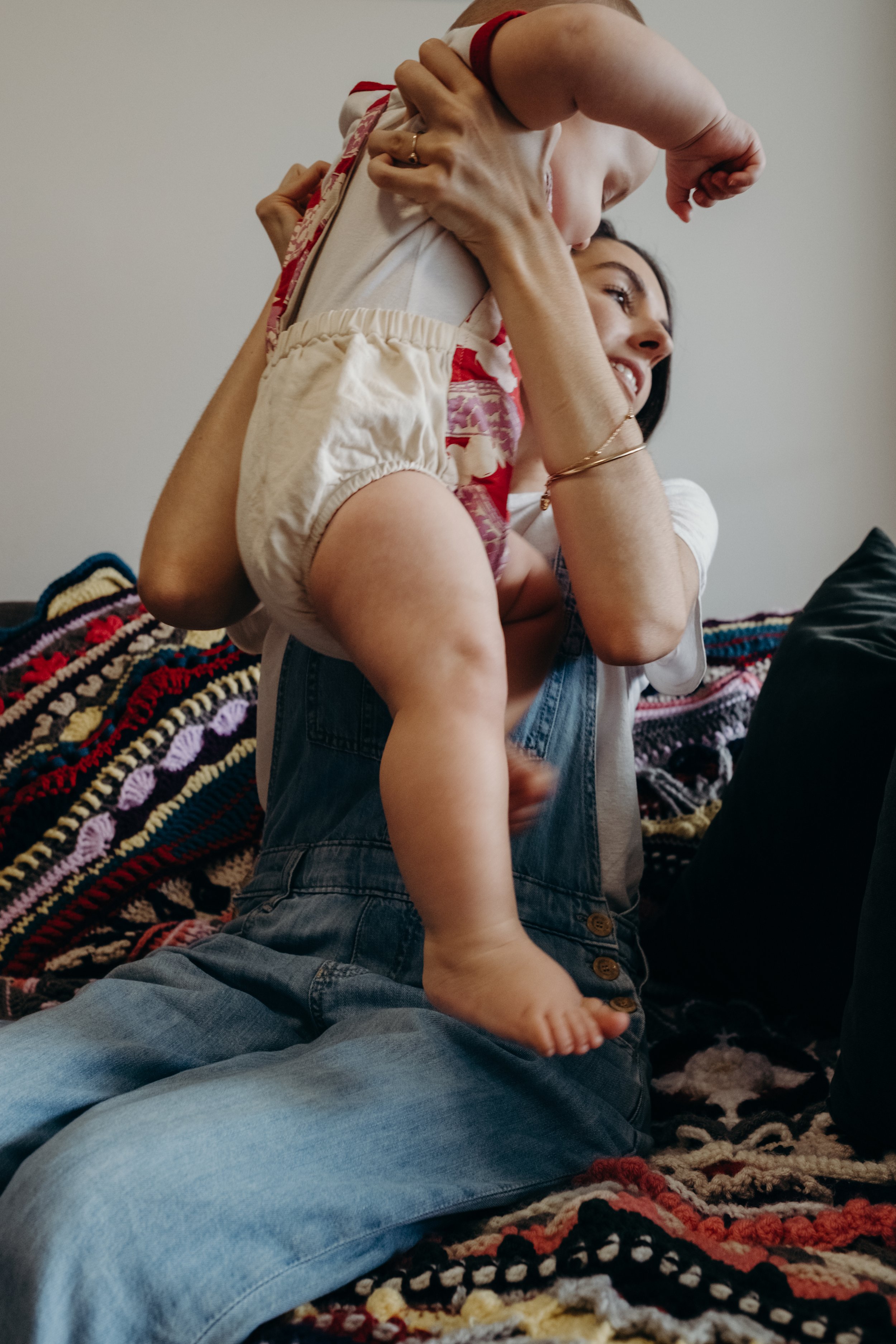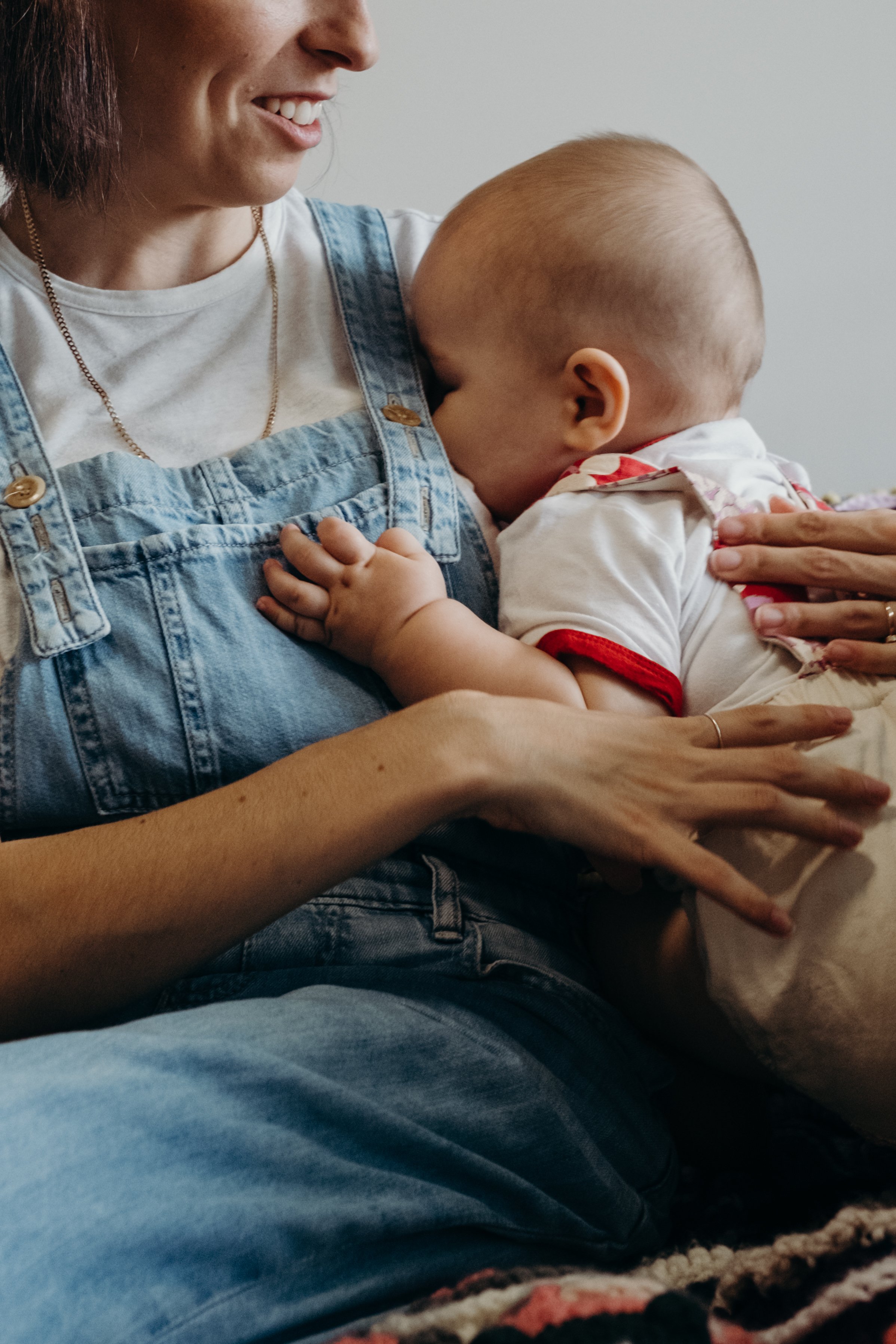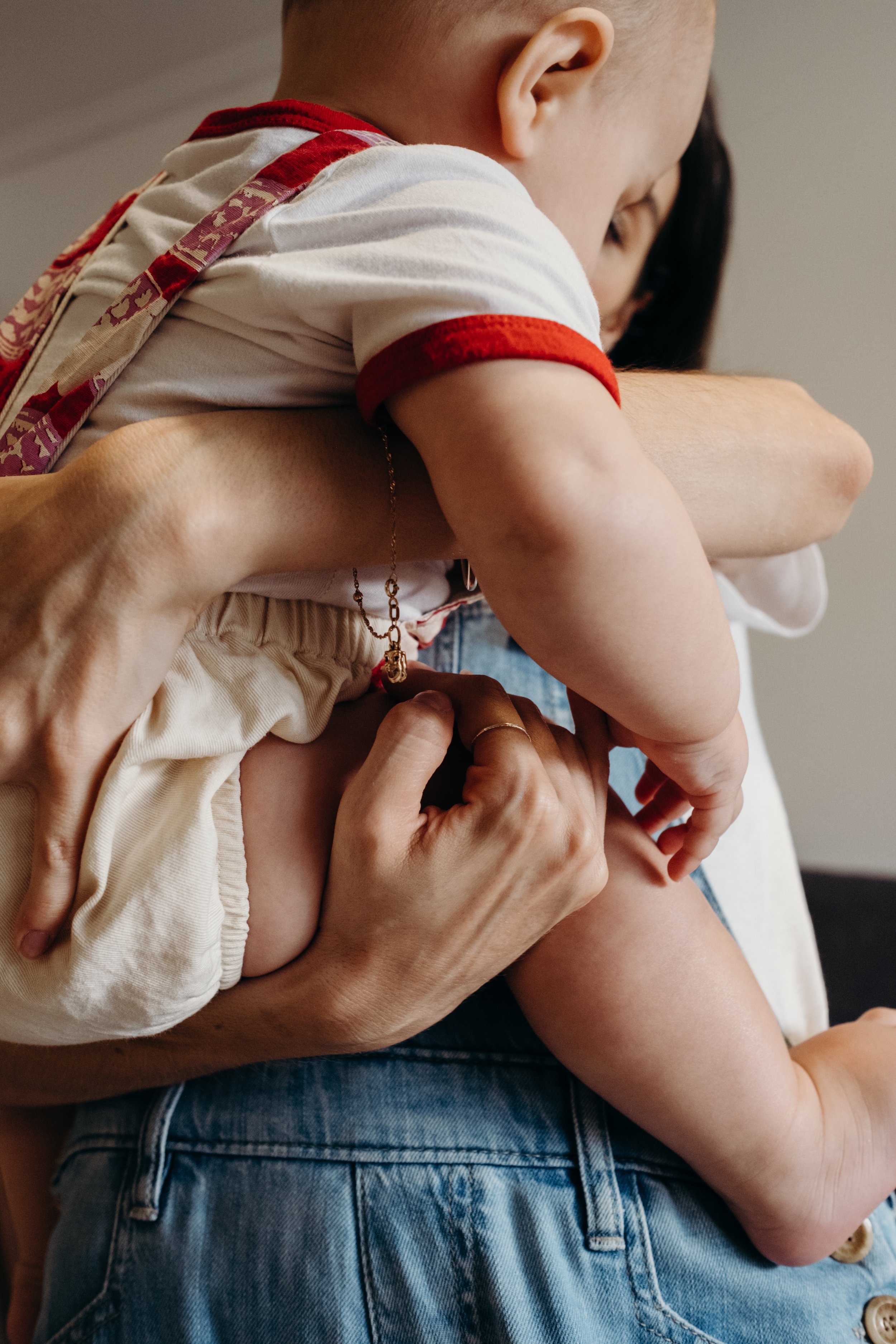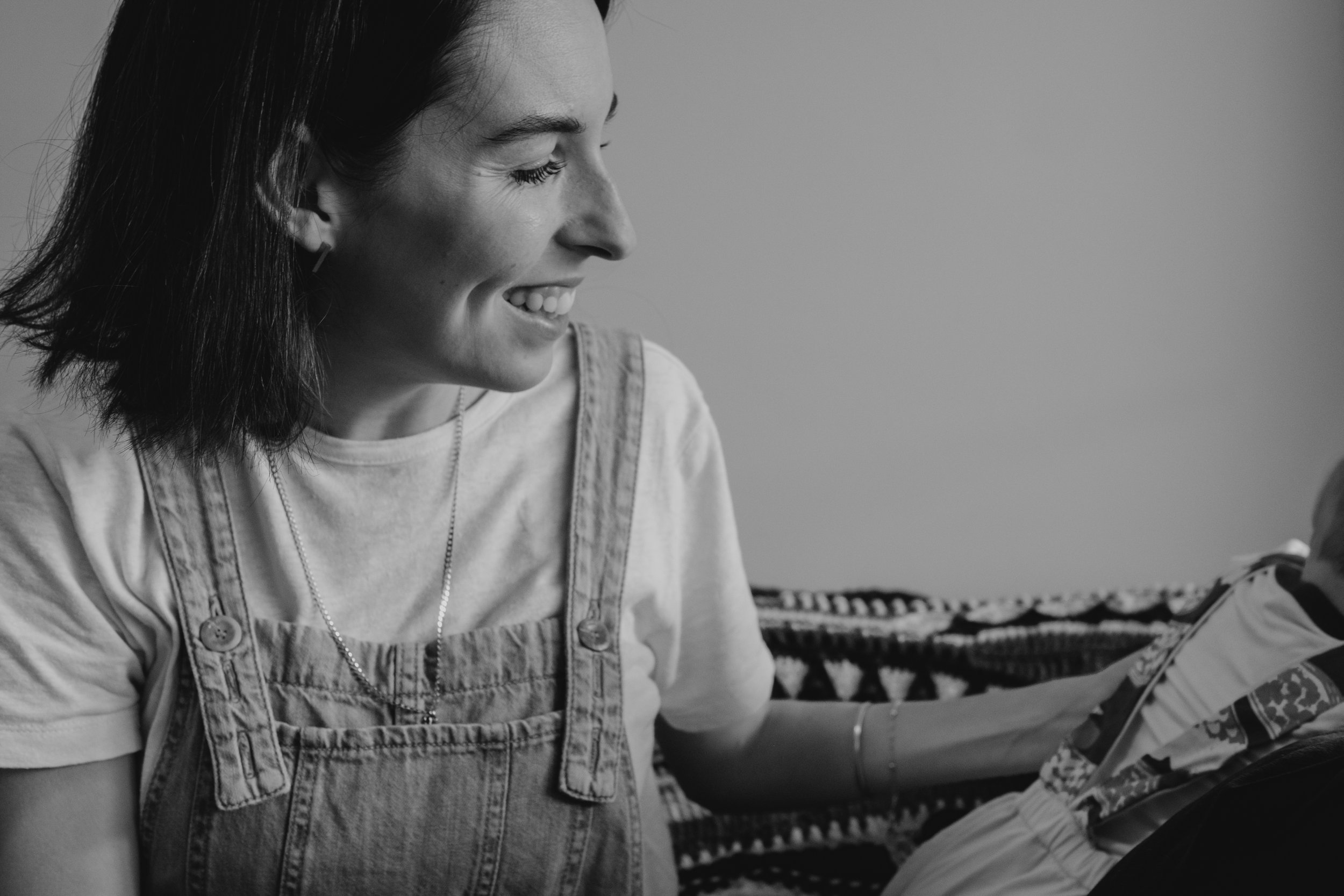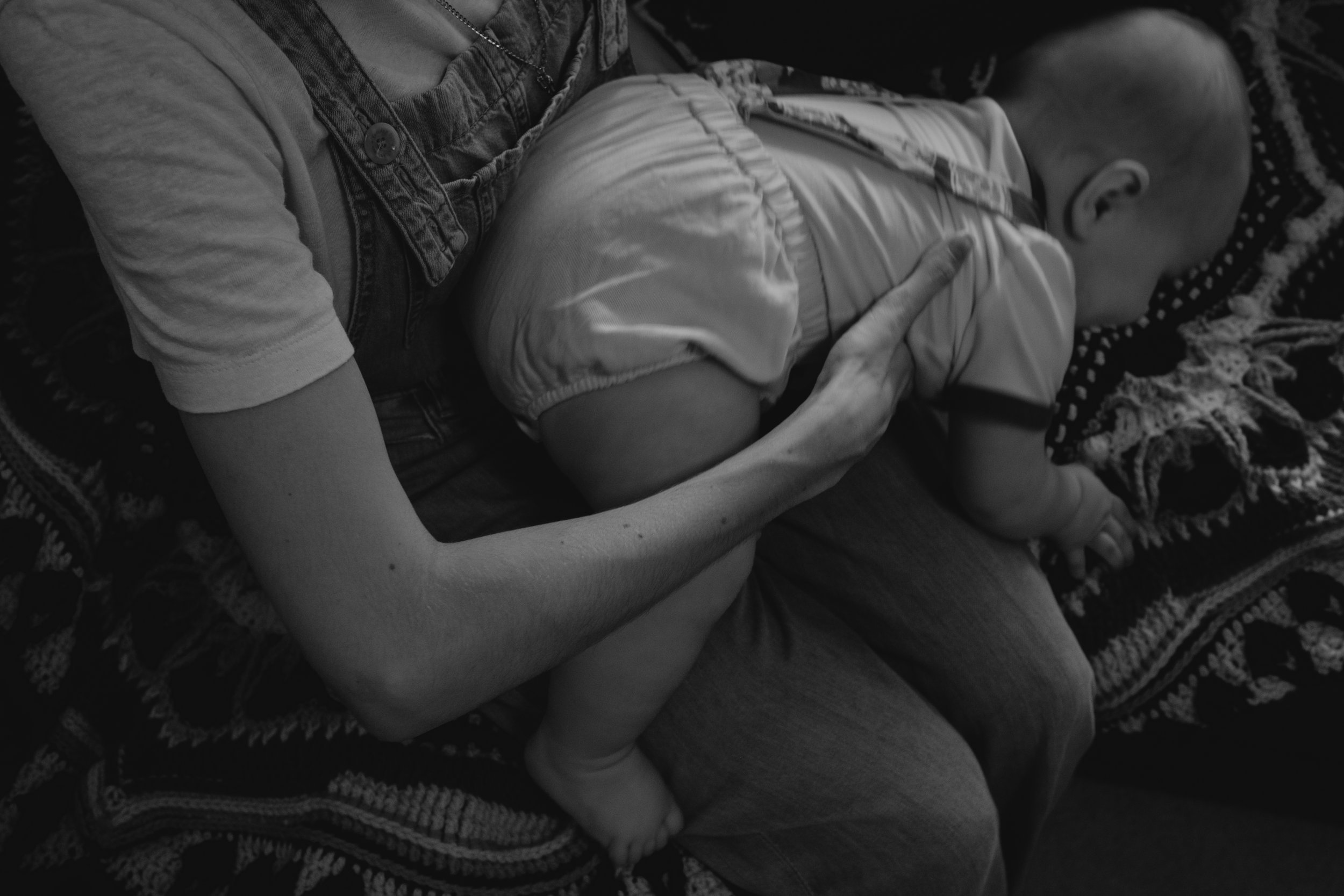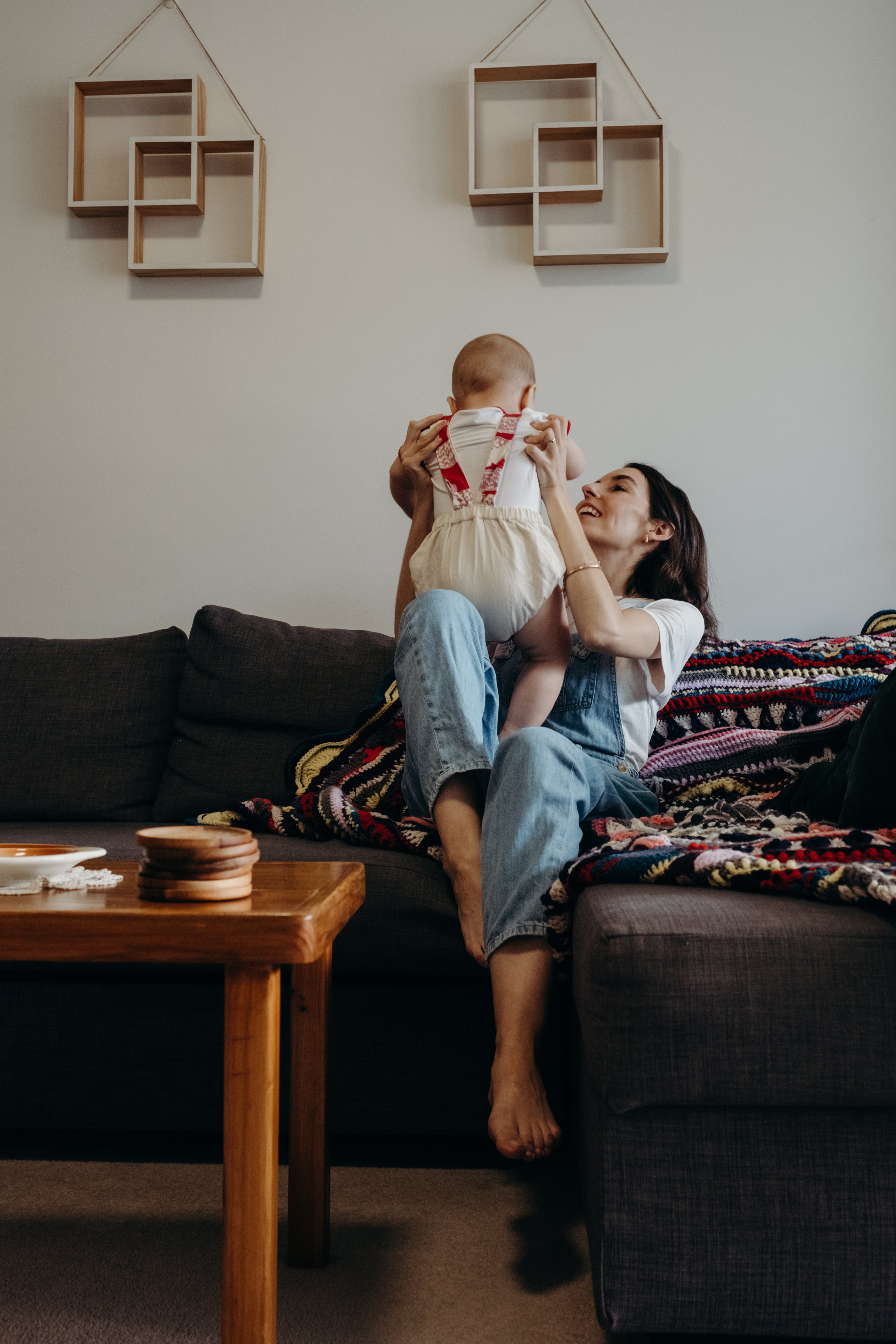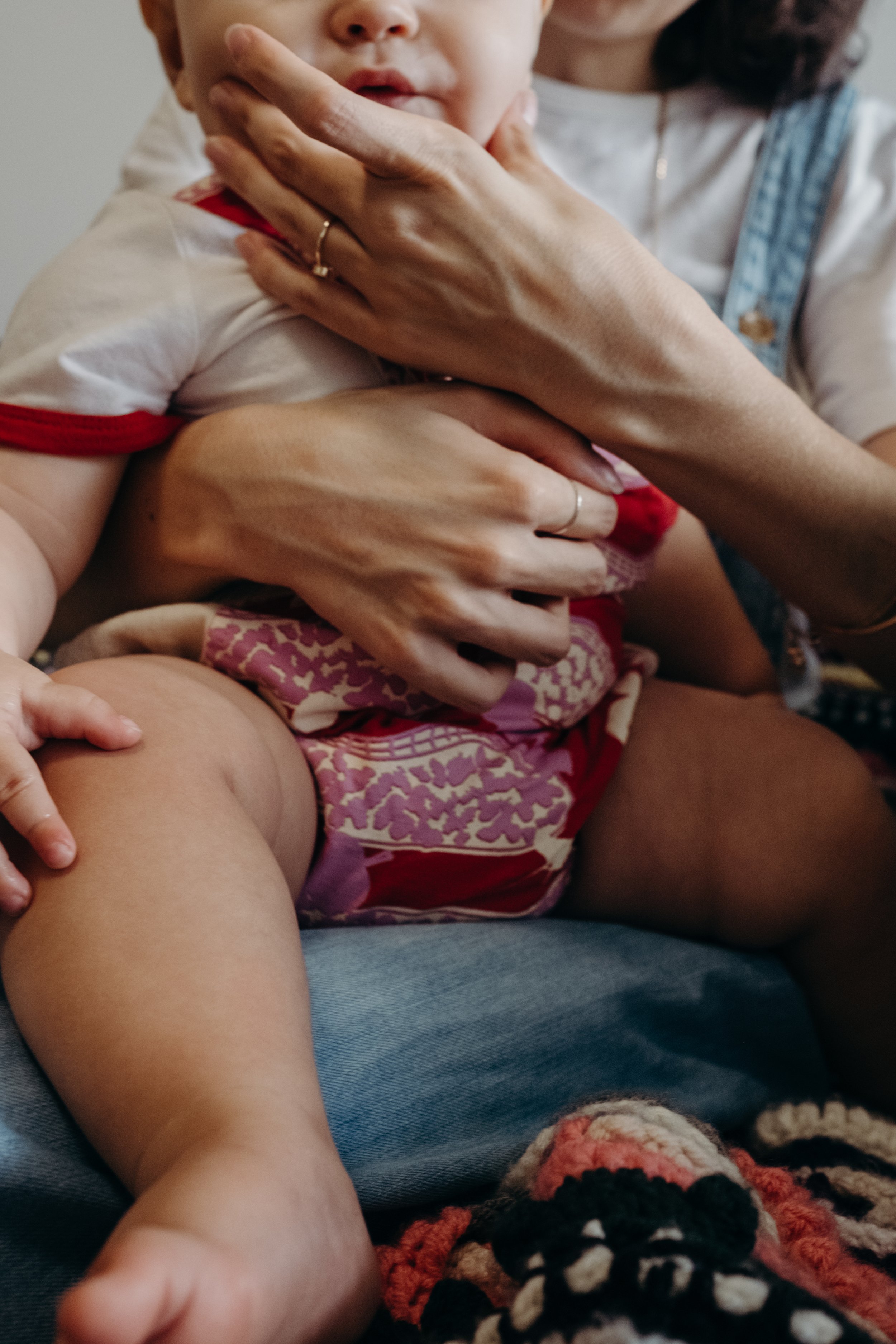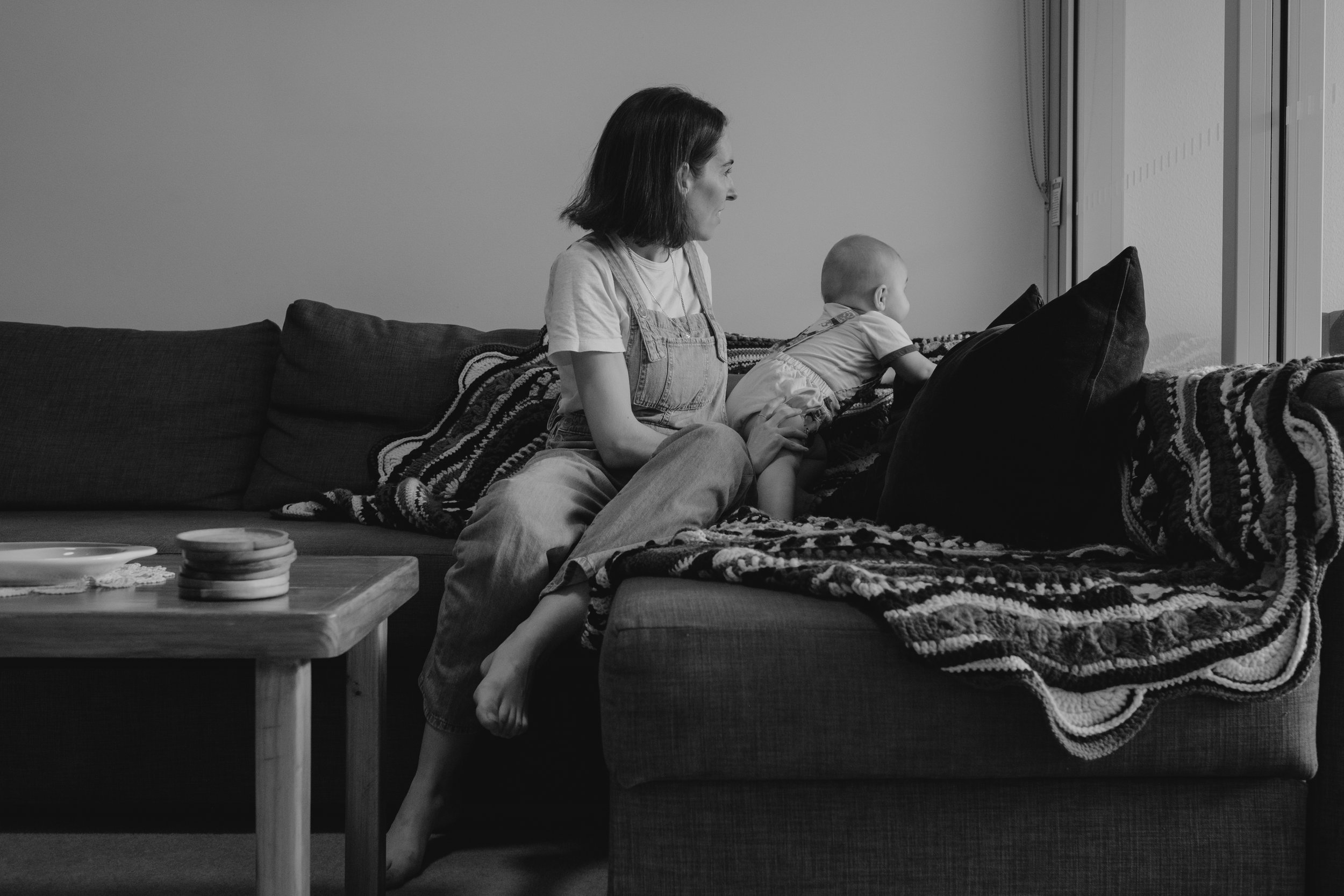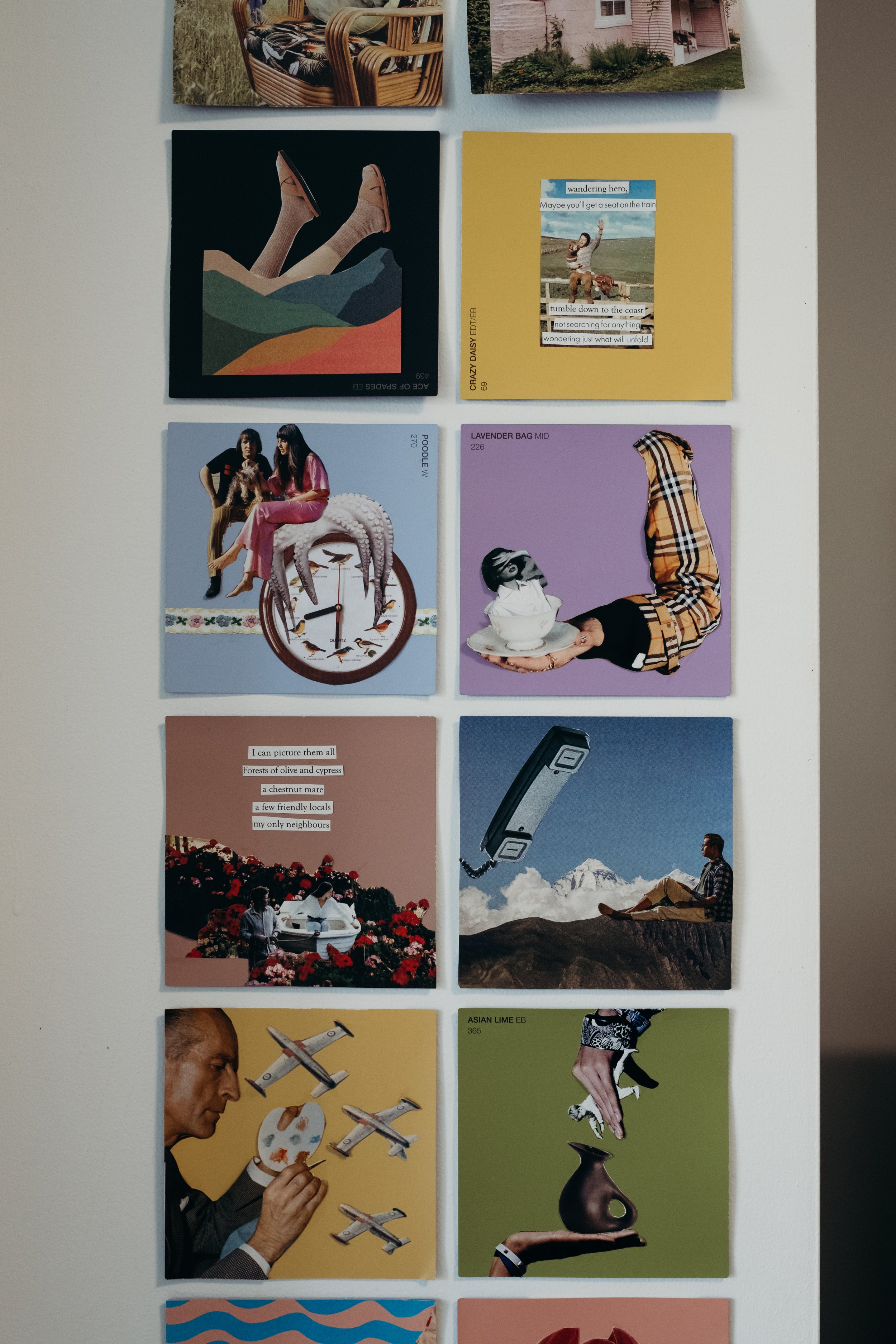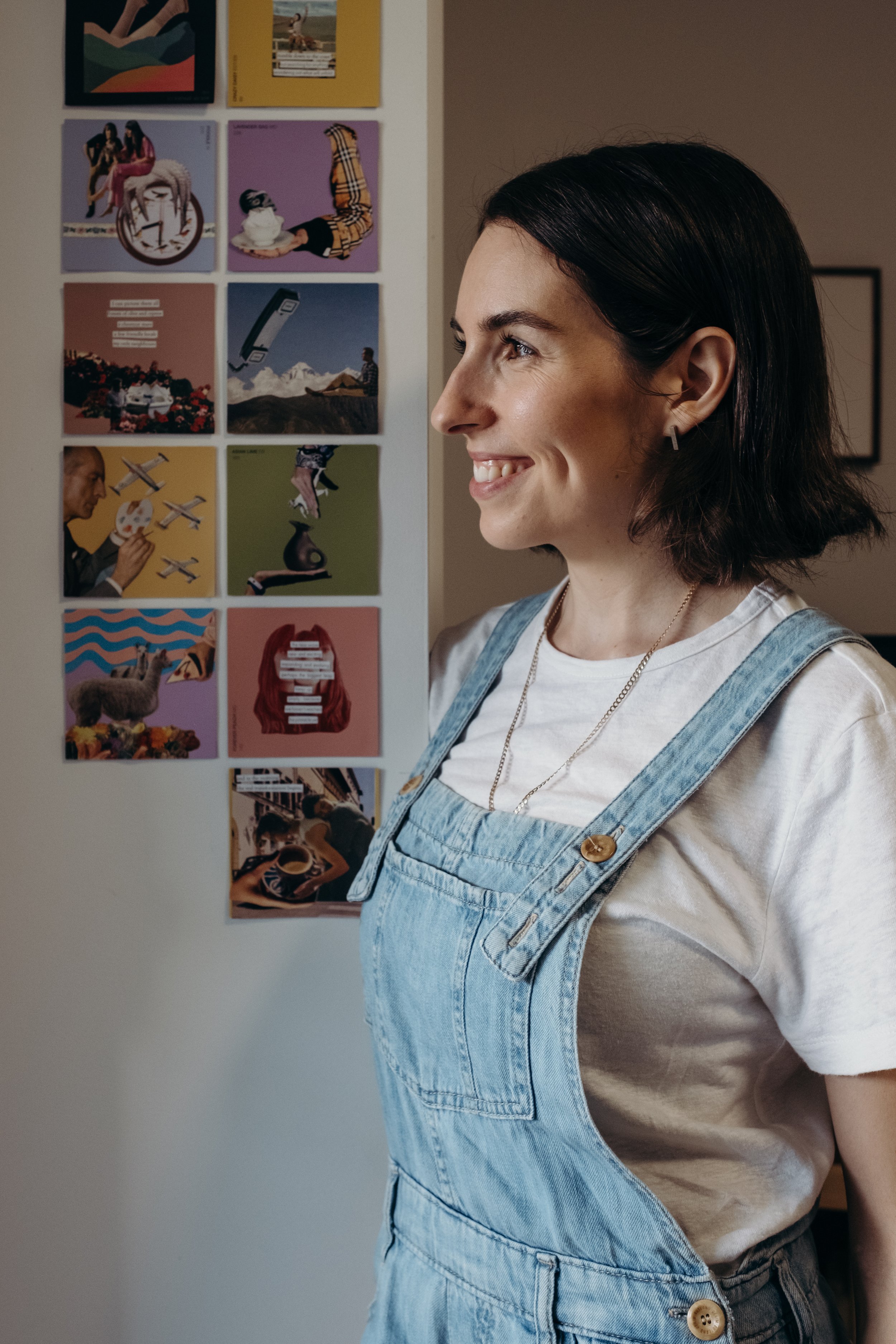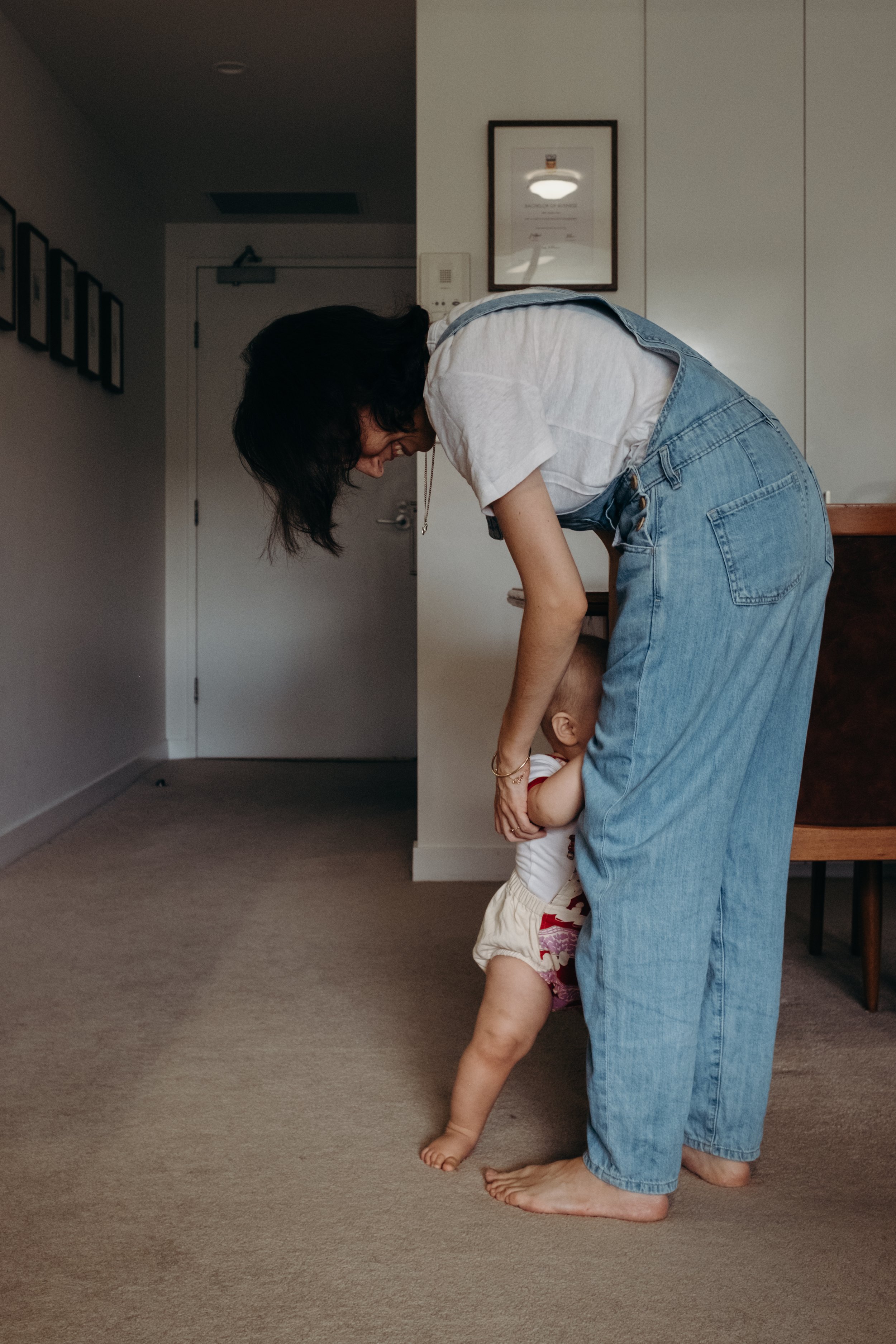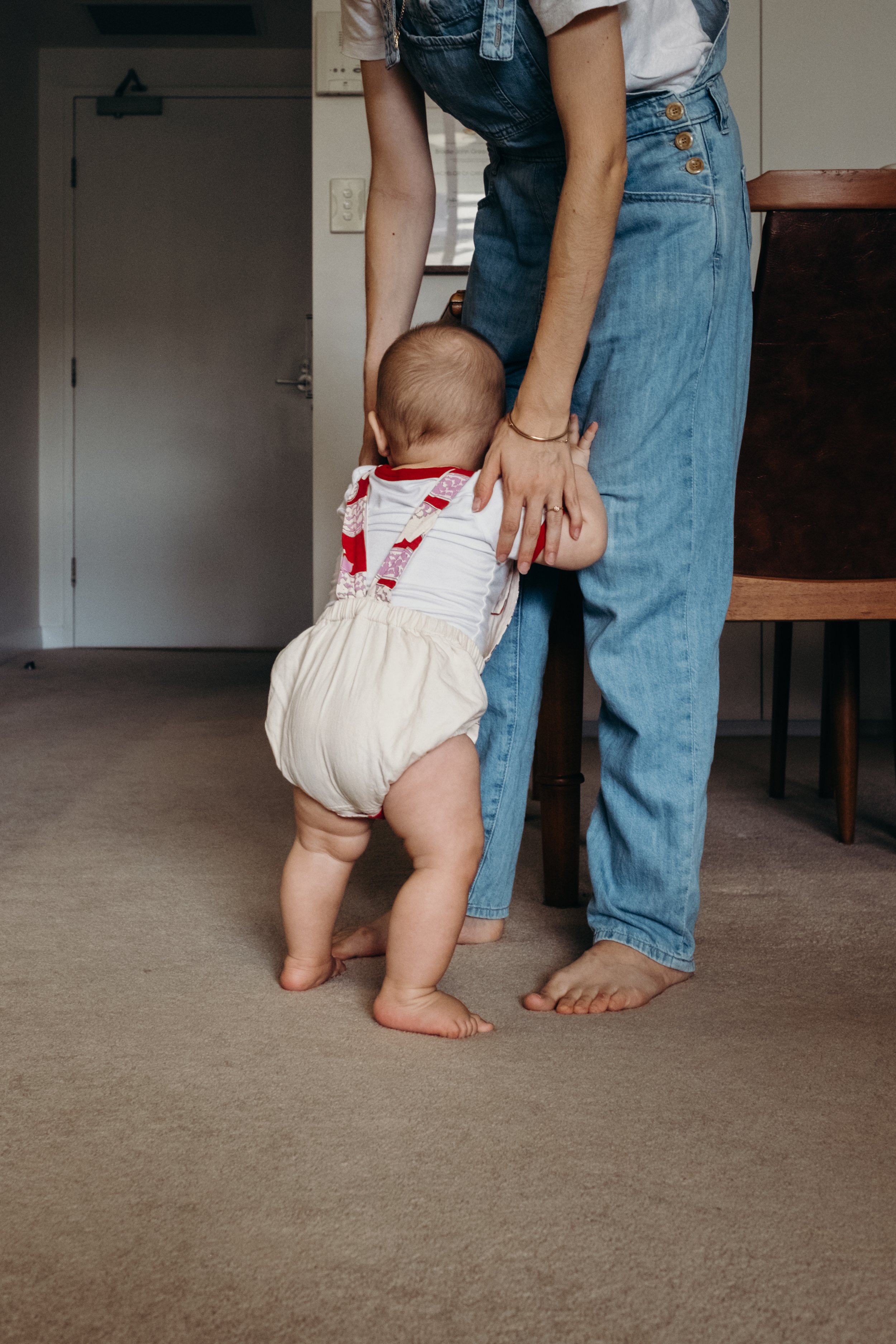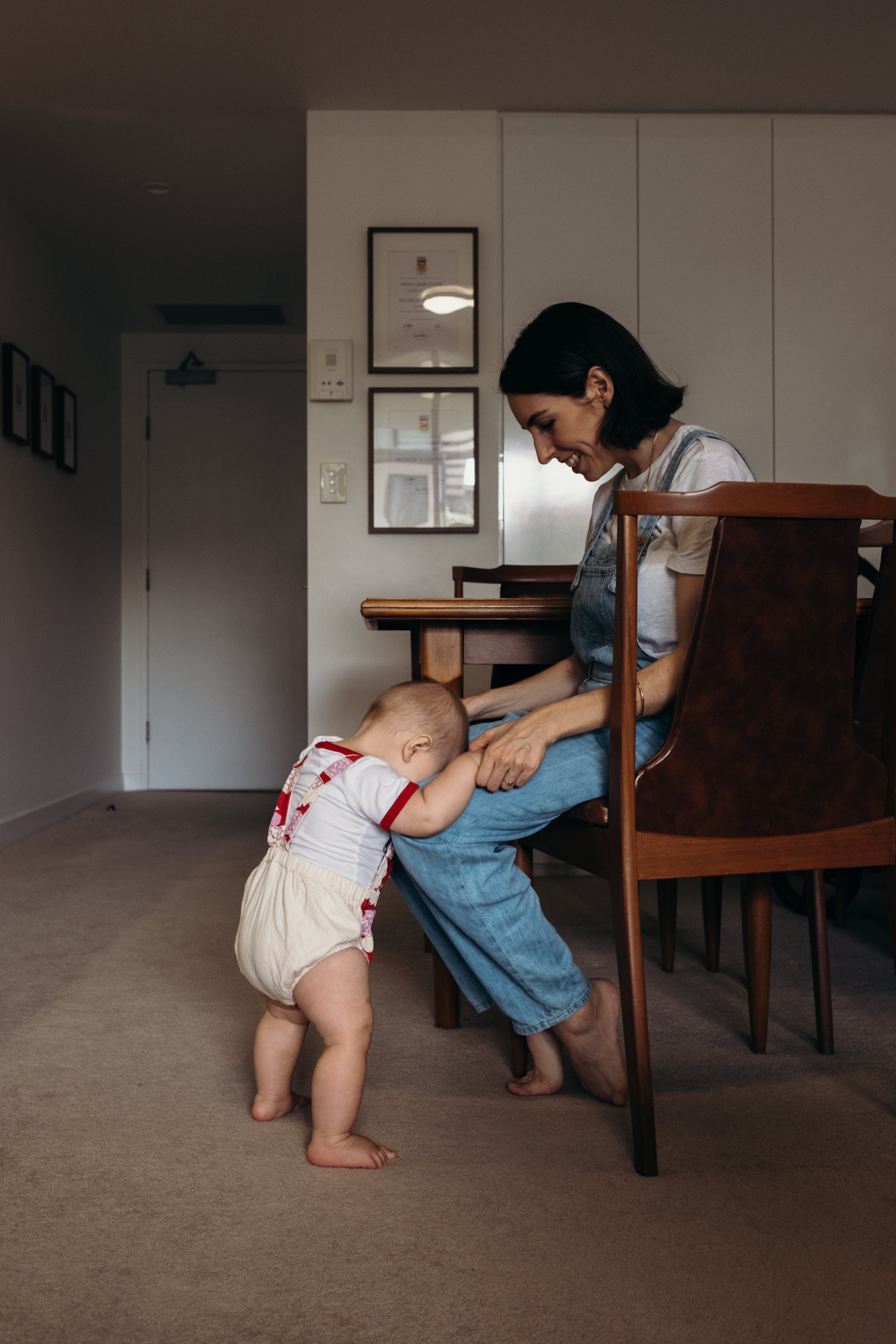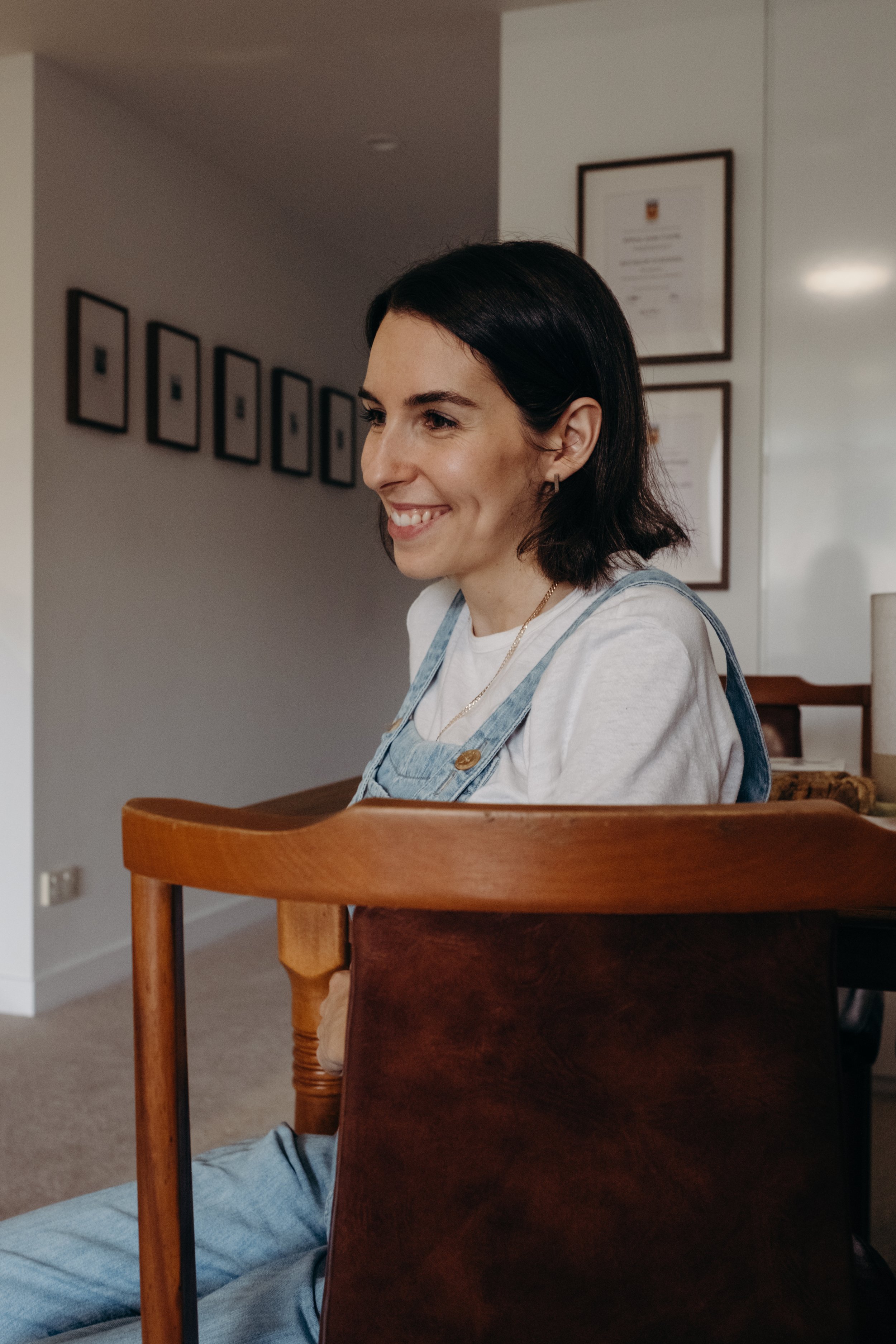In conversation with florist, Emily Richardson
founder of Ruby Lane Flower Co, Emily Richardson, chats about accidentally finding floristry, how she balances babies with business, and returning home.
as founder of go-to Toowoomba floral destination, ruby lane flower co, and mother to Mac and daisy, Emily has gracefully adapted to each change that has come her way. From working out where to call home, and scaling her still growing business, emily has learnt the power of putting down roots.
This feels like a lovely full circle moment. One minute we’re in primary school together, and it’s 90s birthday parties & sleepovers, and now we’re running creative businesses & raising babies! You have Mac & now Daisy. How are you?
I'm good. It's been an adjustment, but I think I struggled more from zero to one, whereas one to two feels like you're already parenting, you're just parenting a little bit more. Maybe Mitch has to parent a little bit more (not that he's not already) but I think he's found it more of a struggle because he's had to have Mac where I've had Daisy. But I feel like the adjustment is making sure both are happy and dealing with the mum guilt of, are you neglecting one or the other? But besides that, I feel like our lifestyle was already in that routine, so I don't know. I feel good. I feel a lot more settled this time. This time I knew what I wanted to do with work as all those decisions were already made with Mac. I know more about how I want to parent, so that's felt a little bit nicer, whereas that felt a bit more stressful the first time around. You're kind of inventing the wheel the first time and seeing what works, whereas this time, I know what works for us, and it's just adding another child into the mix. So I feel like it's been a little bit easier to get our head around this time.
That’s really good to hear! We know you as an exceptional florist, curator & the founder of Ruby Lane Flower Co. With roots in Toowoomba but with time spent in Brisbane, you have returned with your brand to build a family & future in Toowoomba. What brought you back?
So I moved to London at first. That was my first get-out-of-Toowoomba moment. I moved there for six months and then came back to finish off uni and start working. But then I came back to Toowoomba and was like, no, I've just come from London, I need something bigger. So then I moved to Brisbane, and that was where I met Mitch and got married. We decided together that maybe we were ready for something different. So we were going to move to the coast, and then right as we were about to move, we had a going away party and realised we couldn't afford the coast! But we'd already told everyone, so we were like, well, where are we going to go?
We started sort of looking back in Toowoomba. I always thought I would never come back, but we were back for just one weekend visiting my parents, it was Autumn so there were all the fallen leaves in Queens Park. It was really beautiful. The weather's cooler, and Mitch loves the colder weather, so it was more him being like, “This is actually really nice. We’ve never really considered it, but we're looking to start having kids. so is this the sort of a place that we should be going with more affordable housing?”.
So we moved here sort of on a trial period, and I was still like, “I don't know…” I think everyone who grew up in Toowoomba has that “get out of the bubble” feeling, but in coming back, I think you just appreciate the good parts. Also, in coming back as an adult wanting to start a family, you can see all the benefits which you don't see when you're 18. So yeah, we just came back.
There was also a lot of creative things happening at the time, and I think that really drew us in. So the trial period pretty quickly became a permanent decision, because we just started getting involved in little things around town. It felt nice to be building something, not moving to a big city that's already got all these creative programs established, but to feel like we could actually make a difference here, or be a part of this community. To help build it from the ground up sort of thing, I mean.
And really you have. You came back at quite a pivotal time in the landscape of small business and creativity in Toowoomba, and very quickly made quite an impact. Can you tell me about your journey into floristry & how it all began?
So when I came back from London, I was about to finish my Bachelor of Communication, so I was doing PR, and then sort of realised that I didn't want to do that. I thought maybe I'll do a degree in nutrition, whether I work as a dietitian, or whether I just incorporate it with the communication degree and do public health or something. So I went back to Brisbane and finished that and started working as a nutritionist. I just didn't think of myself as a creative person when I was growing up, and I felt a lot of pressure to be stereotypically smart and do science. I did well at school, [so I thought when I finished school] that meant I had to do something with that. That society equates that to being… I don't know. So while I did that, I would love to go into the flower markets in Brisbane. I would just go the markets and get flowers for myself, and started making up more little arrangements around the house.
A friend was getting married and trying keep it quite cheap, and she was like, “Do you want to do my wedding flowers?” And so I did that. And then it was really Mitch who, because he had worked creatively for himself since he graduated school, said, “Yeah, great. Do it as a business.”
And I was like, you can't just do that! You can't just go and become a florist. And he was like, “Why not? We're together. We're fine money wise. you can have a break if you want to try it and If it doesn't work, you have things to fall back on.” We didn't have kids so it really was a risk free time but I'm not a risky person. I really struggled with that - thinking I could just go out and do it. It was so ingrained that you have to study to do it. [So I was thinking], do I have to go back and study floristry? But I just didn't love the modules and how it is framed at your typical TAFE, so I just started doing it really casually. I was still working through the week and then on Saturdays, I would just make up “Posies of the Day”. They just started selling at first to friends and then we made a very official website. I remember the first time someone rang and bought one that I didn't know. I was like, “Oh my gosh. This is amazing, it’s not just my friends trying to be nice. Someone actually bought it!” And then Saturdays just started booming. I pulled back one day at work and did them on Fridays and Saturdays. And then it was Mitch [who said that I needed to] go the whole hog and see. So I just quit my job and started doing it, and it really it was such a blessing. It really took off straight away or it was enough to make me feel like it was going to be okay. So I did a little bit of training with another florist so that I felt like I did have more base skills. And then, yeah, just kept it going.
That's amazing! You and Mitch are both wonderfully creative people and creative business people. How is the juggle with now two full time businesses and two little people?
Yeah, it is tricky. I think one of us is always doing something. When I moved back [to Toowoomba], he [Mitch] was doing a lot more weddings and his business [castle and crown] was still on the coast at the time, so he kept that going. I moved back and tried to get established here. When covid hit he lost his weddings, so he started doing something else, and I started my shop. That was more steady, and so he had time to work on his business. Then we added the kids! Since then it's like, just keep the businesses going so that we can have kids! It does feel like we're always trying to let one person focus on things I guess. Even now, I'm on maternity leave and I've got employees there [at Ruby Lane] who can keep it going. That gives Mitch an opportunity now and he's building something different - a studio space in town, [precinct studio], so now that's our focus.
Having the two kids, there's not really enough space for us both to be full time parenting, or full time at home and building businesses. It has to be a bit of give and take. He helps me with my stuff, and then I have space in my life to help him with his. So we are very collaborative, I would say. We are always in each other's pockets and know what is happening. he's sometimes down at the shop, and I'm sometimes up with him. It’s very convenient that his businesses are now above mine, which is really nice. Now he's upstairs, so it'll literally be him coming down for coffee, and then I can pop up and see him, and I'm hoping it'll be good with Daisy.
To me, that sounds like a dream. And you're now on the second iteration of your bricks and mortar store. Can you tell me about Ruby Lane now, compared to the beginning and how you're feeling about its constant evolution?
I think it's nice, it keeps it fresh. at first wanting to focus on weddings, and then we were looking at having kids so we were like, oh, would it be easier to have a shop and really focus on the daily delivery side of it? And so then we built the shop, and it happened to be just when covid hit, so I lost weddings anyway. So I was like, well, let's focus on a bricks and mortar store. And so we did that and built it, and it meant that I could have staff. And so when we had Mac, I could leave, and the business could keep going. So I was really grateful for that, because when I was doing it at home, or when I was just doing weddings, it was just me. to have the opportunity to still be able to earn an income from it, and be off for the amount of time that I want to be off is great.
But it just got to the point [in the old space] where a friend wanted the space that we were in, and asked if we would consider moving. there was no pressure, but we'd always wanted to add coffee, and so I was like, great! Maybe it's an opportunity to move. So then we went and saw the Rowes building. It was just perfect. It had the courtyard, it had a workshop space that we can use for our workshops. It had something like a coffee window, and so it was just the perfect space to then add coffee. I think each time it's changed, it's good for business. Like it's good for the business to keep it fresh, but I think it's also good for me to keep it fresh. It just makes you get really excited about it and sort of reconfigure how you do things and gives you something else to focus on. And I like that part of it. I like doing different elements of it.
I can see you like working on the business as much as you like working in the business.
Yes, but always both. I'll never just do one.
You’ve been able to step back from the in person running of the business to grow your family. How have you found the transition from being on the floor to behind the scenes?
I think that's where sometimes Mitch and I differ, because he's very much like, “Oh, wouldn't it just be great to have staff in there doing the flowers, and you just work on the business, and you can be behind the scenes and building it up and doing the marketing.” But I was like, “Yeah, I did a degree in marketing and PR, and I hated it and I didn't want to do it.” I love working in floristry. I really love the hands on element. I love talking to the people that come in and buy them. I love seeing people getting flowers. Even with the deliveries - we have couriers now, but I will always still do a couple of deliveries a week, because I love it. I love seeing people's faces when they get flowers. I take Daisy down, I’m on maternity leave really, but I'll take her down. I just hang out. But also, maybe because it is a nice space, like flowers are always nice. It's set up to be beautiful, it's meant to be peaceful and it's meant to be joyful. That is what giving flowers is. and the gift of giving all the time.
Motherhood changes us in so many ways. How are you feeling now compared to when you moved back home? Have you found motherhood has changed how you view your business at all?
I think the best advice I got when I was having kids was, “Don't decide when you'll go back to work until you've had the kid.” Growing up, I always thought that I would stop working and I would have children, and I would be at home all the time. Then I really loved my job, and so then I was like, actually, will I go back to work full time after having the kids? Now, I love striking the balance between the two. So until they're in school and fully, you know, away, I think I've set a really good balance of part time work.
I mean, part time work when you're in your own business is full time work, part time being there a couple of days a week, and then being at home and getting to do fun activities with kids. I love the balance of going to those things with them, having holidays with them, having them home with me, and then other days where they're in daycare two days a week and I get to go and just be fully in the business and be a part of it. So I couldn't decide that until I actually had them and realised I really loved both, and I couldn't handle doing both, or being away from both but yeah, you can't decide that until you're there.
Now I'm so grateful that I did set up the store as I can be away and set my own hours and be with kids. I can still go in anytime I want and be in that world as well. And present. It's about being present in both halves, which is tricky. There are definitely weeks where, like this week, the kids were sick, and it got to the end of the week and I was like, I did not talk to the staff at all, like I was not there, and thank goodness they kept running it well. We've got really good people in place. But it definitely feels like I probably didn't give enough to that side this week. But that's the balance.
How does it feel raising Mac & Daisy in the city you grew up in?
It's really nice. There's little things like when we go to the Queen's Park, there's the same slide that I went on when I was a kid. I'm such a nostalgic person and I love feeding into that nostalgia. Things like finding photos of things that were the same… and so I really enjoyed that. And I think I'm so comfortable with what is here and the things that I enjoyed, but then there's also so much here that wasn't here when I was a kid. And I think that's enough to make it feel different, to make it feel exciting and like I'm living a different life. I'm not just repeating it.
There's a lot more sort of going on here than when I grew up. And that's what keeps it exciting as an adult too, that there's more to discover all the time.
How has your house shaped how you live & work with your little people?
We get very drawn to farm life, like having chickens and being out of town and having the space. But I think the benefit to being right in the city while they're little and we don't have a big backyard is, we can get out at any point and go down to the park, or we can quickly drive to a cafe, or we can go to the library, or we can do all those activities really easily. So while we don't have a lot of the space that we would desire, having a smaller house where the house is really comfortable, and it's so close to other parks and other things, sort of fills the gap in the meantime. So we debate it all the time, and now that our businesses are both set up here, it's like, do we need to be right in the city because it’s so easy, and we can duck home really easily. But I think our dream is to still live a little bit further out and have chickens and ducks and goats.
What’s next for you and Ruby Lane?
I think at this point I’ve built it to a point where I'm happy with it. I can keep it going, and have kids and get them sorted, and get them into school and just have stability. So I think for now, the focus turns to Mitch and what he wants to do and how he wants to build. And at the moment, that's really exciting, and so we're working on that stuff. But I think for me, I’m just enjoying it. I know Mitch is more of the let’s grow, let's build, let's do stuff type of person. I'm more like the slowpoke, but I think sometimes that stability is nice because it does allow you the lifestyle that you want. And for me right now, that's being with kids and getting them sorted.
It’s been an absolute delight to be with you this morning. Thank you so much for having me.
Thank you.
for more from emily, you can find her at @rubylaneflowerco and @emilyrich_.
photography & words by morgan smith for morgan journal.
In conversation with writer, Athina Greenhalgh
Sustainability writer, Athina Greenhalgh, shares all things freelance, motherhood, creativity & beyond.
Until recently we’d known Athina Greenhalgh as a writer for Outland Denim, capturing audiences with sunlit campaigns and educating denim diehards on sustainable manufacturing. Since then she has opened her scope as a freelance Sustainability Copywriter, working with brands who are determined to make an impact. In 2023 Athina & her husband welcomed their boy, Ávgoustus to their family, which also includes Gabby the Bearded Collie. I made tea for us in her kitchen, and Athina generously shared all things freelance, motherhood, creativity & beyond while we watched Áv explore his little world.
How are you having navigated the journey from working full time, to making the decision to go freelance, to becoming a mother? How did that all come about?
I had felt my brain being pulled in a couple of different directions before falling pregnant. I adored my job and the brand, but I also had this idea that freelance might suit motherhood really well with the flexibility of that. So eventually after thinking about it for a really long time, made the call that that's what I would do. But then a few weeks later, we had a positive pregnancy test. So I didn't really intend for both things to happen. I thought maybe I'll have like a little run up with freelance and then you know, find my feet with it and and then fall pregnant, but it just happened at the exact same time.
In some ways at the time it was really chaotic and quite frankly, dumb to do. But then, on the other hand, it forced me to learn a lot of lessons very quickly. I couldn't muck around figuring out how freelance work best for me. I just had to figure it out as soon as possible.
How does it feel going from working as part of a team on one brand to being a team of one? And now with many small, purpose-led businesses coming to you!
I think what surprised me at first was how isolating it can be. Because even though over COVID we all sort of got used to working from home or solo working, you’d still have a team member on the other end of a phone call, or a Slack message or an email, and you have a shorthand and a rapport.
Now it’s a different relationship. And it's the building up of that rapport again, so it doesn't feel so transactional and so you don't feel so isolated. That was really tricky towards the beginning. As part of that, we naturally want feedback on our work. And I think when you're in that very familiar team environment, people's confidence in your competence comes in formal and informal, direct and indirect ways. It’s reiterated so much throughout the day. You know, like the, “You’re a legend!” after you’ve sent something through. Things like that. Whereas I had to get used to it that with freelance, you don't have that shorthand and that rapport straight away with people. So you're going, did you actually like it? Did I actually do a good job on that? Am I a fraud? [Laughs.]
That's also true when you’re at home as a new mum. And for you, those things happen simultaneously. We don’t always get feedback on our mothering (especially from you right now Ávgoustus, you’re a bit short on words).
How was it navigating new motherhood with a new business? Were you able to take a break from work or did you feel you had to be on while you were learning to be “Mum”?
A bit of both. I was definitely “Mum” first. I had a couple of months off which was great as I’d been working part time up to [having Áv] as well. And then I think in the third month, (I was still mostly having maternity leave), but I took one of my monthly clients back on and just started gradually building it up from there. I was in a really lucky position that my partner could consistently have one to two days off work still on parental leave while I got used to it.
You were able to share the load fairly well?
Oh, yeah, definitely. We shared the load heaps! We’re really lucky that my partner had an excellent amount of parental leave, so we were able to share it. And I was able to slowly transition back into work. So now we're sort of in the next phase of that transition of him back full time. So it's changing again for me now.
How are you liking working with different impactful businesses now that you have been Athina Greenhalgh, Writer, for a year?
It’s great! It's an area I'm really passionate about personally. I naively thought last year was for learning, or the pregnancy phase was for learning and then by this year I'd know what I'm doing. [Laughs.] But yeah, it's been really great. I'm so lucky that everyone I've worked with has been so amazing. Where I'm at now is working out specifically what people's needs are in terms of writing in the world at the moment. There is so much writing that can be done, so I’m trying to be specific.
Probably the other part of learning this year, while having less time, is that within that space innovation and research changes so frequently. So that's something I've had to accept and pivot away from [and work out] how I can still be of service to my area and my target industry. But I accept that those projects surrounding research or communicating research or communicating broad scale impact and keeping up to date with what's happening in the industry - I kind of don't really have capacity at the moment to be as across that as I used to be. So I’m going, “That's okay!” How else can I help?
You write from such an emotive place. The human experience is loud and clear within your work. Do you feel that has been exacerbated by what you have experienced in early motherhood?
Yeah, it definitely has. I mean, obviously in ways like setting up time boundaries and all of that sort of thing. But the work itself probably has, though I haven't really thought about it specifically in a tonal sense, or in an emotive sense. There would definitely be subconscious influences there. But I think I've always been really terrible at writing for myself, which I guess we all are in a way, but I couldn't start a journal for myself. I've always said that I don't feel like I have anything to say. But to write for other people, I find that a lot easier.
You’re an interpreter of sorts. You hear what the rest of us ramble on about and managed to make perfect sense of it.
Yep, I'm much better at that! [Laughs.] I can't work out what's happening up here. [Laughs, pointing to her head.] But other people's words I can do.
Well, on that note you've been working with wordplay through your collages, which, as a viewer, has become an obsession of mine. It seems to be an obsession of yours as well. Where did the wordplay start? How did that element of fun sneak in?
It is, honestly, my flow state. I need to schedule collage time in, which I'm not always great at, but I need it. My friends and I love to get together and collage, and I literally got to the point with some of my magazines that they were so torn up and no images left, I was like, I'll just play around with cutting out the words. And as I said before, I kind of need a brief to be able to write. I can't just journal my own thoughts. This was a really good way of going well, the words are already on the page, I'm just editing them together. I always feel like it doesn't make any sense but then other people read it and they naturally switch into this poetic tone of voice and I’m like, [laughing] you fool, those are just random words I cut out, but people have their own interpretations of them.
Every one takes something from what you have put on paper. It’s giving us a new way to read something and it does feel profound. It’s probably bizarre to hear that word associated with your flow state requirement.
It probably subconsciously helps me in my work writing as well. Just that expansion. Getting out of routine thinking, routine vocab, that sort of thing. Up until this year I’ve been really bad at incorporating any kind of play into my work. I've always had fun at work, and been a bit of a class clown at work and laughed a lot at work, but never used play as a tool. I’ve forgotten where I heard this, but I heard someone speaking last year or maybe earlier this year, on the power of, for lack of a better term, networking. But really just getting out, particularly as a freelancer, and seeing other people. And so it started with that kind of thing. Just getting out and trying to expand myself, more than just being a person behind an email. And following joy.
Whenever I was feeling like, “Ooh I’m not really getting as much work as I would like.”, I would try to book in a time to go see people in a sort of networking, but casual sort of setting. I think that the collaging has been a similar vibe to that. I'm just trying to follow the flow and follow the joy and the play and the fun, and trust that everything else will come. I'm glad that you enjoy it because for so long I was [wondering] are people are going to think like, “Athina has lost it! She really mustn't have very much work going on if she's posting her collages. Oops, did she mean to post that?” But in my head it goes. So I'm glad it’s perceived that way as well.
Everything you have just said feels like a reflection of freelance life and motherhood. To follow the joy and the play, and the importance of stepping outside of your bubble. Have you found that the two have gone hand in hand for you fairly well, so far? How have the challenges and the joys presented themselves?
I feel like I'm still in a bit of a teething period in terms of optimising the hours of the week that I have available to work. What can I get done in that time? But overall, I feel like the work always gets done. It somehow gets done by the deadline. You just go what tools do I have in my toolbox? There's the library, we’ll go to the library. There's grandparents, we’ll ask grandparents for help. There's no one way. Somehow it's gotten done for me anyway. I think, as I said, booking in that creative time has been really important to me. That I don't always find easy. Because even though my partner's incredibly helpful, and if I was to be like, “Hey, I'm gonna spend an hour collaging or out and about tonight.”, he'd be like, "Yep, sweet. I'll handle it.” But it's still hard to do. Because if you're at home, doing your creative flow state activity, you can still hear your Bub in the other room. You might be tempted to go, “I'll just go help”. But yeah, I feel like it's working at the minute.
That's great. there would be many , myself included, who lose sight of that outlet or time for themselves. It's I think it's incredible that you have found that so early in your postpartum journey. It aligns so well, with both work and home.
It's getting there gradually. There are definitely things that I haven't gone back to. I haven't gone back to ballet, things like that. But yeah, getting there gradually.
A while ago you started cooking and learning Greek and became The Olive Oil Advocate for a little while? How did that come about?
Gosh I think that came from me wanting to learn Greek, and also learn how to make some more traditional recipes. But then very quickly losing sight of the fun of that, and going, “And also will turn it into an Instagram page - [laughs] and I'll gain a following.” For my brain at least so that's a really good quick way to have me immediately lose interest in it. So then it was, “I don't enjoy creating content for this. I just enjoy the cooking part and the learning part but I'm not enjoying the content creation part." And that's something that my friends who collage with me, we talk about all the time. “Oh, we could do this! Wait, hang on, stop monetising your hobbies.” That was probably the first realisation for me, that if I was to go freelance that writing would be the thing that I would do.
So I've definitely fallen off the bandwagon in terms of learning Greek. Maybe trying to teach Áv will encourage me to jump back on it. I still love cooking. I hate collecting content of me cooking so you're probably never ever, ever going to see it again. But the Instagram page is still there because I can't bear to lose the name Olive Oil Advocate, because I feel like it's so perfect. It's just sitting there collecting dust at the minute in like the the Instagram account idea graveyard. [Laughs].
I think I have four or five of those as well. So you're not alone! All of these projects have such similarities. There is an element of learning, of play, of words. You are forever surrounded by language and words. And something that makes you slow down, whether it be cooking, or collaging. But from what I've seen, there is always a common thread, which has been beautiful to watch.
I've never noticed that through line. So that's again, you need some perspective I guess sometimes to see these things.
You do, but I can also see how everything has culminated in where you are now. And I can't wait to see my next. You’re obviously having fun writing for these conscious, ethical businesses!
I guess just naturally with freelance imposter syndrome likes to creep its way in. But I've learned from again, getting out and talking to people, that is a natural byproduct of freelance life and working on your own. Now that I can better identify that I am really enjoying it and always was but it was just yeah, that would occasionally creep in. But I'm loving it. Some days I'm like, “Oh, what I did today was learn about cool brands with cool products doing cool things and I might buy one of those when I've submitted this blog.” That's really fun. Because it would be what I enjoy doing anyway.
It's wonderful to see and I know you feel like you're juggling it all because you are you're doing an incredible job.
Thank you.
For more from Athina, you can find her at @athinagreenhalgh.writtenby.
photography & words by morgan smith for morgan journal.














